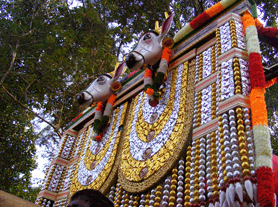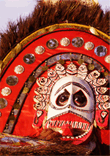“Culture nourishes itself from nature. Without nature, culture cannot exist; without culture, a society cannot.” |

Vayali Folklore Group “Learning folklore is not retrogression but a realisation” |
||||
Birth of a group… “Culture is the sum of all the forms of art, of love, and of thought, which, in the course of centuries, have enabled man to be less enslaved” - Andre Malraux (Historian, Novelist and Statesman, 1901-1976) Nothing gives us a more concise explanation than these elegant words by the French historian Andre Malraux and Folklore plays a very important role in transmitting a culture's morals and values. This very reason brought together a group of young men one evening in the summer of 2004. They shared a common interest...an interest in preserving the folklore along the banks of the once mighty river Nila. In a traditional house made of bamboo & coconut leaves, these young men met regularly to discuss, research & learn the various art forms practiced by our ancestors. The "Vayali Folklore Group" was thus born! Early Days... The early days of "Vayali" were very challenging. Most of the members were from the socially backward communities and found it hard to earn a livelihood. Being the sole breadwinners made their position more difficult. Driven by our passion for folklore, we organised ourselves and started formulating our plans. It was then we struck a brilliant solution to solve the financial problems of our members. We started performing at various places thus promoting the folklore and compensated financially. "Vayali" now became a source of livelihood for the members. We went about diligently collecting various folk songs and art forms from the local masters. Most of the people who practised the various art forms were leaving their art in search of a better livelihood. One of our primary tasks was to make folklore an economically viable option for the masters. We urged them to pursue their traditional professions, helping them show case their knowledge through "Vayali" and make a steady decent income from it. We faced stiff opposition from the communities too but then they soon realised the importance of preserving the traditional knowledge. We now had the support of the communities, which really invigorated us. We were extremely fortunate to meet the famous folklorist Dr. C.R Rajagopalan, who is the Director of the Centre for Folklore Studies; an NGO based in Kerala, promoting research in the field of traditional knowledge. He said, "Do not imitate others, build your own identity and showcase your culture and tradition through that". This invaluable and inspiring advice etched in our hearts and has been one of the cornerstones of our group ever since. We firmly believed that innovations are possible in a culture without losing its essence thereby paving the way for new folklore. Vayali Now… We had taken a "road thats never been taken" and had our apprehensions but we are happy we did what we did. The difficulties of the early days are over and we can now clearly see the road ahead. We have grown from strength to strength and now have 26 members and the loving support of the communities. This has motivated us immensely to start new initiatives. Effective management involves delegating work to groups which also instills a sense of responsibility. This resulted in the creation of the teams in Vayali. We now have 4 teams responsible for the the various activities namely: |
||||
|
 |
|||
Vayali Folklore Expressions Group The "Vayali Folk Expressions" group was started in the year 2004 and is responsible for all the folklore programmes. It does all the planning, rehearsal and co-ordination with programme booking agencies. All future activities are also planned by this team. Since the last couple of years we are working with "The Blue Yonder" (http://www.theblueyonder.com), an organisation promoting responsible tourism initiatives in Kerala. We have been absolutely fortunate to get the task of introducing people to the traditional artisans who have been struggling to keep their art alive. The visitors spend a day with us and are introduced to the traditional potters, blacksmiths, goldsmiths etc...getting a chance to observe their art. In the evening a programme showcasing the various Valluvanadan art forms is arranged for the visitors. This gives the younger generation an exciting & enlightening opportunity to observe these amazing arts. The local people lend us their wholehearted support which is without a doubt one of the most important pillars of strength of Vayali. Vayali Bamboo Orchestra In November 2007 the Vayali team was blessed with a fantastic opportunity to perform at the Traditional Music and Rhythm Festival organised by the Cultural Department of Japan. We showcased the Valluvanadan art forms at the festival. The whole experience was truly enlightening and wonderful!. We learned about the bamboo musical instruments of the Japanese and their world famous bamboo orchestra. This deeply inspired us and lead to the creation of the "Vayali Bamboo Orchestra". We realised that we had to preserve the bamboo culture in India and set about researching & learning the various traditional bamboo instruments. Flute is the lead instrument of the "Vayali Bamboo Orchestra". The other instruments in our repository are Mulam Chenda, Mulam Thudi and Mazha Mooli. We now have a small team which has developed an expertise in 5 bamboo instruments of the tribals in Kerala. The team has created some truly innovative instruments too! Vayali Community Archive Project & NAIP "Vayali" joined hands with the National Folklore Support Centre (http://www.indianfolklore.org) in the year 2008 to build a comprehensive library of traditional knowledge. This painstaking exercise involves researching & documenting the various traditional systems. The information thus collated is reviewed by experts on folklore and disseminated in a simple format to people. We firmly believe that imparting this wonderful knowledge to the younger generation is necessary to retain our knowledge for the generations to come. Thus started the program called the Nila Adolescents Intervention Program (NAIP). As part of this program, we would be collaborating with schools and colleges to share the priceless knowledge with the students. We aim to achieve personal development and bringing about a right attitude to Mother Nature. We would be starting this in a few schools in our village during the next academic year. Vayali Eco-Bazar The idea of a Vayali Eco-Bazar was conceived in the year 2007. We launched it a couple of months back and has quickly become one of our dream projects now. We are promoting the development and use of eco-friendly products like traditional handicrafts, organic food items, paper bags, jute products, terracotta items and books / materials about folklore / traditional knowledge. We are spreading the message of living in harmony with the nature through this initiative. We have started a small eco-shop in our village and working hard to promote this amongst the people. We participate in various exhibitions organised by the government and other organisations to spread this message. |
||||
| Our Vision… | ||||
|
We are working hard to realise an ambitious vision, which we call our "Vision 2010".
|
|
supported by: TheBlueYonder All rights Reserved to Vayali. © Copyright 2009 - 2018 Powered by: Opsotech Infomedia |
